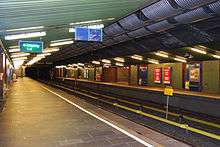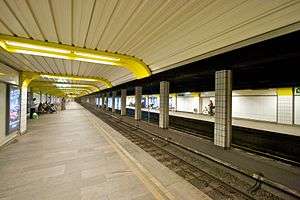Peer Qvam
Peer Hafslo Qvam (24 December 1911 – 27 July 1977) was a Norwegian architect.[1]
He was born at Holmestrand in Vestfold, Norway. He was a son of chemical engineer Olaf Hafslo Qvam (1873–1960) and his wife Sigrid Sørby (1875–1929). He enrolled as a student in 1931, and graduated in architecture from the Norwegian Institute of Technology in 1936. In 1938 he married Elsa Wik (1913-1981). He first worked for architects Johan Meyer, Dagfinn Morseth and Mads Wiel Gedde. In 1944 he started his own architect's office in Oslo. From 1946-58, Qvam worked in partnership (Engh og Seip Arkitektkontor A/S) with John Engh.[2][3]
Qvam is especially known for his railway station architecture. Qvam and Engh won a contest to design Oslo Central Station in 1946. From 1956 he was a consultant for the municipal office that planned the Oslo Tunnel, as well as two stations in this tunnel: Elisenberg and Nationaltheatret. He also designed seven stations in the Oslo Metro network.[2] In the city center there were Jernbanetorget, Grønland and Tøyen, designed between 1961 and 1964 and opened in May 1966. On the Grorud Line there were Carl Berners plass, Risløkka, Vollebekk and Veitvet, designed between 1960 and 1964 and opened in October 1966.[4]
Gallery
 Toyen Metro Station
Toyen Metro Station- Jernbanetorget Metro Station
 Grønland Metro Station
Grønland Metro Station- Carl Berners plass Metro Station
References
- "Peer Hafslo Qvam". WikiStrinda. Retrieved September 1, 2017.
- Steenstrup, Bjørn, ed. (1973). "Qvam, Peer". Hvem er hvem? (in Norwegian). Oslo: Aschehoug. p. 449. Retrieved 7 February 2011.
- Elisabeth Seip. "John Engh". Norsk kunstnerleksikon. Retrieved September 1, 2017.
- "T-banestasjonene i øst" (in Norwegian). Ruter. 11 March 2008. Archived from the original on 15 June 2008. Retrieved 7 February 2011.
Related reading
- Carroll L. V. Meeks (1995) The Railroad Station: An Architectural History (Courier Corporation) ISBN 9780486286273
| Wikimedia Commons has media related to Peer Qvam. |